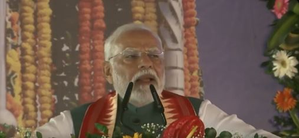Headlines
PM JANMAN Yojana benefitting tribal society in the country, says PM Modi on Janjatiya Gaurav Divas

Patna, Nov 16
On the 150th birth anniversary of freedom fighter Birsa Munda, Prime Minister Narendra Modi has highlighted the accomplishments and significance of the Pradhan Mantri Janjati Adivasi Nyaya Maha Abhiyan (PM-JANMAN) Yojana, a flagship initiative launched by the Central government aimed at uplifting tribal communities across the country, particularly marginalised sections of society.
The Prime Minister, while addressing a programme on Friday in Bihar's Jamui, also praised President Droupadi Murmu as India's first tribal President, calling it a historic achievement for the NDA and crediting her with advancing the cause of tribal welfare.
"Whether it is culture or social justice, the current NDA government has a different parameter. I believe this is a great fortune of the BJP and NDA that we got the opportunity to make Droupadi Murmu the President of India. I also want to acknowledge Bihar Chief Minister Nitish Kumar for his proactive role in campaigning for her presidency during the election," the Prime Minister said.
Marking the completion of one year of the PM-JANMAN Yojana, PM Modi attributed its success to President Murmu's leadership and advocacy for the tribal community.
"The scheme focuses on addressing the challenges of the most backward tribes within the tribal community. Projects under the scheme include housing, roads, healthcare, and education to transform tribal villages," the Prime Minister said.
He criticised previous governments for neglecting the extremely backward sections of the tribal population, highlighting the NDA's efforts to fill this gap.
"When she (Droupadi Murmu) was the Governor of Jharkhand and later became the President, she mentioned extremely backward people among the tribal community," he said.
The emphasis on PM JANMAN Yojana and the recognition of President Murmu's contributions serve as a testament to the NDA's focus on inclusive development and the empowerment of tribal communities, PM Modi said.
This aligns with the celebration of Birsa Munda, an icon of tribal resistance and pride, showcasing the government's efforts to honour and uplift marginalised groups in a culturally and historically significant manner, he added.
"We have allocated Rs 24,000 crore under the PM JANMAN Yojana, focusing on improving the lives of extremely backward tribal communities. After the completion of one year of this flagship scheme, thousands of houses have been provided to tribal families, construction of roads has begun to connect remote tribal villages and potable tap water is being supplied directly to households in tribal areas," PM Modi said.
He announced that the 150th birth anniversary of Birsa Munda would be commemorated over the next year to rectify historical omissions and highlight tribal contributions to India's heritage and independence.
"We have taken such an initiative in a bid to honestly rectify the historic error. After independence, the tribal society was not given the appropriate stake they were entitled to," he said.
The Prime Minister connected tribal society's historical contributions to India's culture and independence.
He referred to their role in shaping Indian traditions, including elevating "Prince Ram into Lord Ram".
Tribal communities were at the forefront of the freedom struggle, as evidenced by movements like Birsa Munda's Ulgulan, the Santhal Rebellion, and the Kol Uprising.
PM Modi criticised the deliberate sidelining of tribal contributions by past governments.
He alleged that the focus on crediting a single party or family for independence overshadowed the efforts of tribal leaders and communities.
"If only one party, only one family has brought independence, then why did Bhagwan Birsa Munda's Ulgulan movement take place, what was the Santhal Revolution, what was the Kol Revolution?" he said.
He added that this "selfish politics" led to the erasure of invaluable tribal history from mainstream narratives.
Prime Minister Modi paid tributes to various tribal leaders and their roles in India's history.
"Who could forget the contributions of Kol and Bhil tribes for their support of Maharana Pratap in his fight for independence? They have supported Chhatrapati Shivaji Maharaj and given them strength in the forests of the Sahyadri Hills. Freedom fighters like Alluri Sitarama Raju, Tilka Manjhi, Sidhu Kanu, Veer Narayan Singh, Rani Durgavati, Jatra Bhagat, Belan Kharia, and others fought against the British across India."
Prime Minister Modi stressed the NDA government's transformational policies for tribal communities.
"Ten years ago there was a budget of less than Rs 25,000 crore. We have allocated fivefold in 10 years, from Rs 25,000 crore to Rs 1.25 lakh crore. We have started Dharti Aaba Janjatiya Gram Utkarsh Abhiyan under which Rs 80,000 crore is being invested in tribal villages to provide basic facilities, create job opportunities, and promote eco-tourism through initiatives like tribal marketing centres and home-stay programmes," he said.
"The current Union government has established two Central universities for tribal students in the last decade, compared to only one in the previous 65 years. We have established 30 medical colleges and 700 Eklavya schools, apart from many other engineering, polytechnic, and ITI colleges in tribal districts, and focus on higher education in mother tongue to remove language barriers," he added.
PM Modi said that the government established a museum dedicated to Birsa Munda in Ranchi, a monumental step in commemorating tribal history.
"I want to appeal to the students to see the museum in Ranchi. I am pleased to say that today one museum in Chhindwara in the name of Badal Bhoi, Raja Shankar Shah, and Raghunath Shah Museum in Jabalpur was inaugurated today," he added.
"The youths of tribal society have also displayed exemplary works in sports. There is a big contribution of tribal sportspersons in winning medals at the global tournaments," he said.
PM Modi also visited the Haat at Jamui where the tribal people displayed their homemade products.



































